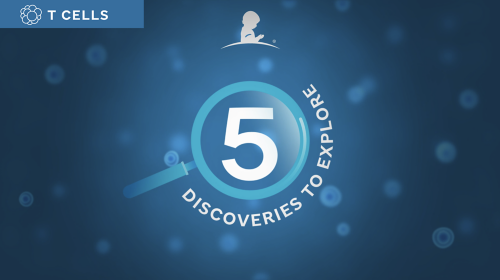St. Jude Family of Websites
Explore our cutting edge research, world-class patient care, career opportunities and more.
St. Jude Children's Research Hospital Home

- Fundraising
St. Jude Family of Websites
Explore our cutting edge research, world-class patient care, career opportunities and more.
St. Jude Children's Research Hospital Home

- Fundraising
St. Jude On T cells 5 Discoveries to Explore

Explore some of the discovery's chronicles in the St. Jude On T cells series.
Kaity Allen, PhD, breaks down 5 Discoveries to Explore from the St. Jude On T cells series.
Hi, I’m Dr. Kaity Allen, a senior scientist in the Department of Immunology at St. Jude Children’s Research Hospital, and here are 5 Discoveries to Explore about T cells.
Discovery 1
The immune system is complex, with many different components and functions. Scientists at St. Jude are studying these aspects of immunity to gain a better understanding of human health and how we respond to disease. The laboratories of Drs. Yongqiang Feng and Benjamin Youngblood investigate how T-cell function and response are regulated by epigenetics.
Find out more: Immunity in the spotlight: How vaccinations and the immune system protect us.
Discovery 2
Innate-like T cells detect antigens, then rapidly produce an inflammatory response to attack a pathogen or tumor. When these cells malfunction, they can also trigger autoimmunity or other inflammatory diseases. Research led by Dr. Hongbo Chi revealed that the protein PTEN acts as a brake for the formation of certain innate-like T cells, preventing some types of autoimmunity. Specifically, PTEN puts a brake on the production of cells that produce the cytokine IL-17.
Find out more: Understanding the complex networks behind a functional adaptive immune system.
Discoveries 3 and 4
By adding a molecular battery to engager T cells, a variant of CAR T cells, Dr. Paulina Velasquez showed that it is possible to get extra mileage out of these cancer-killing cells in preclinical models of acute myeloid leukemia. Velasquez’s lab also found a way to select cells that, when transformed into CAR T cells, are more effective at killing relapsed T-cell acute lymphoblastic leukemia.
Scientists in the Center for Translational Immunology & Immunotherapy, or CeTI, at St. Jude demonstrated that the long-term performance of CAR T cells can, in some cases, be predicted before treatment. Collaborative efforts between the labs of Dr. Paul Thomas and Dr. Stephen Gottschalk, with the Immuno Informatics Group led by Dr. Jeremy Chase Crawford, have created a pipeline for assaying T cells from patient samples to tease apart various disease mechanisms.
Find out more: Engineering a new kind of therapy.
Discovery 5
The lab of Dr. Paul Thomas developed a new analysis for studying T cells, called Clonotype Neighbor Graph Analysis, or CoNGA. While approaches for examining T-cell functional state (how a T cell is responding) and T-cell receptor specificity (what a T cell can bind to) developed separately, recent innovations now allow us to measure these simultaneously from individual cells. CoNGA is an algorithm that uses both of these pieces of information about the T cells to find where the form and function overlap.
Find out more: How scientists visualize and analyze T cells.






